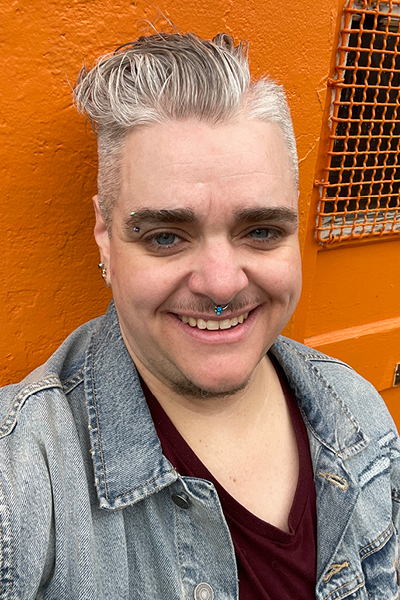Augustana professor named Canada Research Chair in Transgender Creativity and Mental Health
Sydney Tancowny - 2 June 2022

On June 2, the Government of Canada announced the 2021-1 cycle cohort within the Canada Research Chair (CRC) Program. This announcement included Augustana’s first-ever CRC holder, Lucas Crawford.
An associate professor in the Department of Humanities and Fine Arts at the Augustana Faculty, Crawford’s CRC is recognition of his national and international scholarly reputation and the social impact of his work. During his five-year term, his research and community engagement will focus on transgender creativity and mental health.
Mental health touches countless lives, but has particular resonance with many transgender people and communities.
Transgender, genderqueer and gender non-conforming people and communities have existed long before current narratives that too often pathologize their lives and experiences. And, these narratives have often evolved from psychiatrists and sexologists who positioned themselves as authorities about people and communities they did not necessarily understand.
“To this day, our dominant ways of thinking about trans are psychiatric or psychological,” says Crawford.
To derail this way of thinking, Crawford asks where this idea of transgender and mental illness comes from? Who benefits from this idea? And who are the current authorities on what mental health looks like for the community?
More importantly, what do transgender people have to say about all this?
But why creativity?
Combining creativity and mental health may seem like it’s bringing together two completely unrelated fields. Crawford argues differently.
While Crawford works as a researcher and has published an academic book (Transgender Architechtonics: The Shape of Change in Modernist Space), he has also published multiple poetry collections (Sideshow Concessions, High Line Scavenger Hunt, Belated Bris of the Brainsick, and Muster Points). For Crawford, creative writing has been a way to craft his own space in the world.
“Creativity is something everyone can access in their own way,” says Crawford. “It lets us come up with new ways of dealing with things, new ways of being ourselves and new ways of finding a place for ourselves.”
That’s why, in addition to researching theory and historical representations of mental health in the transgender community, Crawford will also focus on works from transgender artists. Through the mediums of film, poetry, performance and prose, Crawford hopes to identify how transgender artists are redefining what their mental health means by treating them as experts regarding their own wellness.
In particular, Crawford is interested in how transgender mental health can be about disrupting the public — whether by bringing intense emotion into the public sphere or by exploring ideas that are still dismissed as “crazy”, “‘bad” or “unworthy.”
“A lot of the trans art I'm interested in isn’t happening in big fancy galleries or published by the best big presses,” says Crawford. “We have to look at things that challenge [those] sometimes deeply held habits around social class and who we think of as the community.”
“That’s where avant-garde art usually happens.”
Monolithic views on mental health? Think again
However, finding a consensus isn’t part of Crawford’s plan. Rather, he intends to display the diverse perspectives within the community. “A lot of the public conversation about transgender acceptance right now relies on this kind of ‘we're normal, we're not crazy’ discourse,” says Crawford.
Yet, there are many transgender people who feel differently. “There are a lot of us who are interested in retaining what is weird, queer, or even mad or ill-seeming about being transgender.”
To Crawford, debate within the community on the topic is necessary, not to find an agreed upon answer, but rather for acceptance.
Of course, Crawford also recognizes that stakes for transgender people are high.
In a 2018 Stats Canada survey, 65.4 per cent of transgender people rated their mental health as negative as compared to 11.3 per cent of cisgender people. Transgender Canadians were also found to have higher levels of suicide ideation, mood or anxiety disorders diagnoses, and experiences of violence and unwanted sexual behaviours.
“Trans oppression has huge mental health outcomes. So mental health can't just be separated so neatly from transgender,” says Crawford. “Mental health is central to how we have and will [continue to] define ourselves. There's no avoiding that. Even if [the way] we want it to matter will really differ between us.”
Creative collaboration
When thinking about his own mental health and personal struggles, it’s been creativity that has given him hope. This is why his current public outreach project takes place in psychiatric wards.
By fall 2023, Crawford looks to introduce free, weekly creative writing classes in 20 psychiatric wards across the country. While he’s still finalizing the proposed curriculum for these facilities, Crawford’s wish is that creative writing courses become available in every one of these facilities in the country.
Alongside Crawford in this work is a team he has assembled specifically for this project. And, it is this opportunity for collaboration that Crawford is most grateful for within his CRC.
“As a researcher, especially in the humanities, you get used to being quite isolated,” he says.
Over the course of his CRC, Crawford is looking forward to the other new ways he can collaborate with his colleagues at the University of Alberta, individuals with mental illness and transgender artists.
Crawford has already been able to work with transgender artists at an event he hosted this past March. “Transgender Art? In Alberta? You Bet!” featured six Alberta-based trans artists, who performed online and welcomed public attendees across the province. The work of these artists were also displayed at an on-campus exhibit in Camrose.
“[My CRC has] given me the time and the funding to be able to think of myself as someone who is meant to bring people together who are doing this work and support them.”
With more plans for bringing visiting speakers to campus in the fall and coming years, Crawford will continue to support and uplift transgender voices. And, perhaps most importantly, what they have to say about their own mental health.